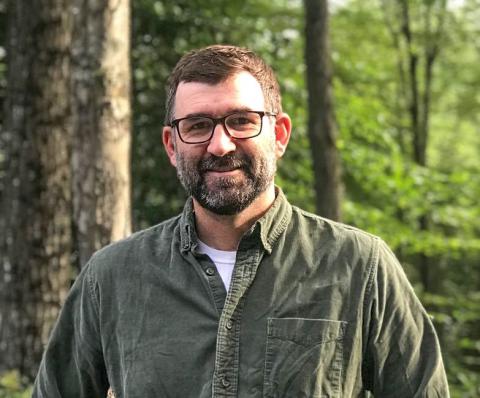
Extension county foresters help citizens and landowners learn about and care for New Hampshire's forests, trees, wildlife and habitats. Because they're usually in the woods, getting to know your county forester can be a challenge. That's why we've created In the Woods, an ongoing series of interviews with Extension foresters. Get to know your county forester and then give them a call to join you on a walk in the woods.
Name: Matt Kelly
Title: Cheshire County Forester, Natural Resources Field Specialist
Start Date at Extension: July 2021
Matt Kelly has joined UNH Cooperative Extension as the new Cheshire County forester. Matt earned his Masters and PhD degrees in forest resources management from SUNY College of Environmental Science and Forestry in Syracuse, NY. Prior to joining the UNH Extension, Matt served on the faculty at Michigan Tech University where he taught courses in forest and natural resources management, timber harvesting, and forest management plan development. His research has focused on a range of topics, including forest policy and economics, family forest owner attitudes and behaviors, and logging operation efficiency and environmental impacts. As the Cheshire County forester, Matt will be working with private landowners to deliver programming and technical assistance. He’ll also be working with conservation groups, consulting foresters, and agency partners throughout the county and state. Matt lives in Keene, NH with his wife and two kids. In his free time, he enjoys spending time with family, hiking, mountain biking, skiing, and playing a variety of musical instruments.
Interested in walking your woodlot with Matt? You can contact him at matt.kelly@unh.edu or (603) 352-4550.
What brought you to Extension?
I care deeply about forests and the practice of sustainable forestry. By working directly with landowners, I'll be in a position to provide technical assistance, help them identify their goals and objectives, and connect them with resources that can help achieve those stewardship goals.
How would your 10-year old self react to what you do?
My 10 year old self wouldn't have known what a forester is. But, he would be happy to learn that his future self would have rich and meaningful career working in the woods!
What originally got you interested in your current field of work?
I wanted to work and live in a place with lots of open space and forestland. I didn't want to be in an office all the time, but I also enjoy working with people. Working for UNH Extension as a county forester checks all those boxes.
Who is a forester who you look up to or who has inspired you?
I've had many instructors and colleagues who have inspired me. However, I've been most inspired by past students of mine who have gone on to become skilled and thoughtful foresters and natural resource professionals.
What energizes you and brings you excitement?
I get energized by learning new things and having new experiences. I also enjoy sharing knowledge about forests and forest ecology with others.
Which NH tree species is the most underrated or has a bad reputation?
I think red maple (aka soft maple) is an underappreciated species. It doesn't produce the most valuable timber, and its not as prized for sugaring as the sugar maple. It's a generalist species, which means it can survive in a range of conditions. I think generalists are important given the many threats New Hampshire's forests face from climate change and invasive pests and pathogens.
If there was one thing you would want landowners to know, what would it be?
Over 75% of New Hampshire's forests are privately owned. Of that, families and individuals (aka non-industrial) comprise the largest ownership group. The forest management decisions of this group affect the current and future conditions of forests across the state, which impacts wildlife, forest products industries, and watershed services. I encourage landowners to learn more about their woodlots and the various opportunities for sustainable management and stewardship. I look forward to working with landowners to do just that.
What's one work-related thing you want to accomplish in the next year?
I want to expand my networks of landowners, foresters, natural resource professionals, and conservation groups. We often think about forestry and land stewardship as focusing on forests, lands, and habitats (and rightly so), but a large part of what foresters and conservationists relies on partnerships and relationships with a wide range of people.
What’s the funniest thing that’s happened to you in the woods or the coolest/memorable moment?
While working in the woods of Michigan's Upper Peninsula, I saw a lone wolf. I was driving on a logging road when it crossed my path. I'll never forget it.
What are you looking forward to in the coming months?
Being outdoors with my family camping, hiking, or mountain biking.
What’s your favorite way to spend a weekend?
Being outdoors with my family camping, hiking, or mountain biking.
If you suddenly became a master at woodworking, what would you make?
A kitchen table. I've wanted a good hand crafted table for a long time.
If you had to describe yourself as a forest animal, which one would it be?
I'd probably describe myself as one of the generalist species (bobcat, coyote, raccoon, etc). I've always considered myself a bit of a generalist.
What's your favorite ice cream flavor?
Moose tracks!
What was the last book you read or movie you saw?
I just finished reading A Wolf Called Wander by Rosanne Parry to my kids, which is based on a real wolf that researched tracked during its roughly 1000-mile journey from Eastern Oregon to Northern California. Prior that I read American Wolf: A True Story of Survival and Obsession in the West by Nate Blakeslee which tells the story of Yellowstone wolves and the people and policies surrounding them. I guess I'm really into wolves lately.
Which meal is your favorite: breakfast, lunch, or dinner?
I'd say dinner is my favorite meal because it brings friends and families together.
Where is the most interesting place you’ve been?
Jakarta, Indonesia. It's just a very different place in many ways from New England.


